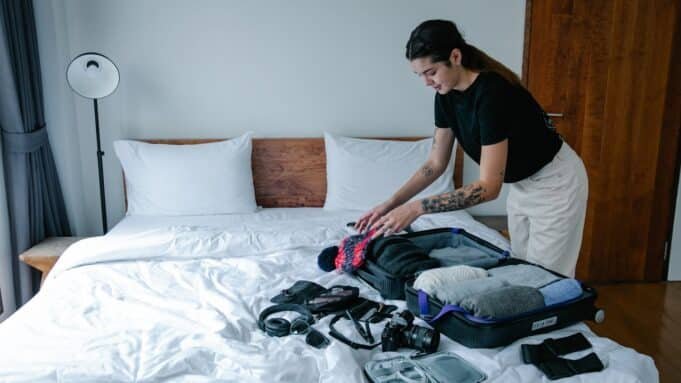What’s the one thing travelers often forget to pack? Not a charger. Not socks. It’s what keeps your body running, your energy steady, and your trip enjoyable: your health essentials.
Too many travelers focus on clothes and gadgets but overlook what their bodies might need when routine disappears. A different climate, unfamiliar food, jet lag, and long days on your feet can mess with your system fast. So whether you’re hopping on a short flight or heading off for a month, health should be part of your planning.
Here’s what to take with you, every time.
Travel Vitamins – Keep Your Immunity in Check
Travel can be hard on your immune system. New environments, different diets, and less sleep are a recipe for getting run down. That’s why travel vitamins deserve a place in your bag, no matter where you’re traveling to or how long your trip is going to be.
Bring the basics first. A good multivitamin covers daily gaps, especially if you’re eating out often or not getting enough vegetables. Then consider immune-supporting extras like vitamin C, D, and zinc. These become even more important if you’re flying, heading to colder places, or around large crowds.
Don’t forget magnesium. It helps with muscle cramps, sleep, and digestion — all things that can act up while traveling.
Use a compact pill organizer or individual sachets to save space. Refill as needed depending on your trip length.
Hydration Helpers – More Than Just Water
Planes are dry. Cities can be humid. Hiking takes it out of you. And you’re likely not drinking as much as you think.
Electrolytes can be a game-changer, especially in hot weather or after long flights. They help your body absorb water more efficiently and prevent headaches, fatigue, and dizziness.
If you’re going to be walking a lot or drinking more alcohol than usual, take rehydration sachets or electrolyte tablets with you. They weigh almost nothing and can save you from wasting a day feeling off.
Herbal teas also help. Peppermint for digestion. Chamomile for sleep. Ginger for nausea. Pack a few favorites in a zip bag and they’ll be there when you need them.
First Aid Basics – Because Accidents Happen
Even a minor cut or headache can become a hassle when you’re away from home. A mini first aid kit keeps you ready without taking up much room.
Here’s what you should pack:
- Adhesive bandages – For blisters, cuts, or scraped knees
- Antiseptic wipes – To clean wounds fast
- Pain relievers – Think ibuprofen or acetaminophen
- Allergy medication – In case of bites, pollen, or surprise foods
- Anti-diarrhea tablets – A must if you’re eating unfamiliar cuisine
- Motion sickness pills – Especially for boats, buses, or winding roads
- Hydrocortisone cream – For bites, rashes, or irritation
Toss everything into a small zip pouch. Check expiration dates before every trip and replace anything outdated.
Sleep Support – Reset Your Body Clock
Sleep disruption is one of the biggest health challenges while traveling. New time zones, hotel noise, or just a different mattress can throw off your sleep routine.
Melatonin supplements can help with jet lag. If you’re crossing more than a couple of time zones, they help your brain shift its rhythm.
Eye masks and earplugs go a long way too. They block out light and noise so your body gets a chance to rest properly, even in unfamiliar environments.
Try to maintain some bedtime habits. Bring whatever helps signal your brain that it’s time to wind down, maybe a lavender roll-on, calming playlist, or even your own pillowcase.
Gut Care – Don’t Let Food Spoil the Fun
Your digestive system is sensitive. Change its rhythm or diet too fast, and you’ll feel it. Constipation, bloating, and stomach upset are all common on the road.
Probiotics can help, especially if you start taking them a few days before departure. They support your gut bacteria and help you adjust to new food and water.
Fiber is another often-forgotten piece. If your diet becomes heavy in carbs or low in vegetables, bring a small fiber supplement or fiber-rich snacks like dried fruit, seeds, or bars.
Also, don’t underestimate the power of hand hygiene. Hand sanitizer or travel-sized soap can cut down the chance of stomach bugs picked up from street food or shared surfaces.
Skin Protectors – Defend Against the Elements
Travel exposes your skin to extremes — dry air on planes, sun at high altitudes, or cold winds on hikes.
Start with sunscreen. Always pack it, even in winter or for city trips. UV rays don’t care about season or location, and sunburn can happen faster when you’re distracted or outdoors more than usual.
Lip balm with SPF is another essential. Same goes for a small tube of moisturizer or aloe if you’re heading somewhere dry or sunny.
If you’re prone to skin reactions, pack a travel-friendly cleanser and keep your skincare routine as close to normal as possible. Unfamiliar products or environmental triggers can cause flare-ups fast.
Support for Long Travel Days – Keep Moving and Circulating
Sitting still for hours on end — planes, trains, long drives — affects more than comfort. It slows circulation, tightens muscles, and leaves you feeling heavy or sore.
Compression socks are worth packing if you’re flying or expect lots of seated travel. They help reduce swelling and lower the risk of clots, especially on long flights.
A small massage ball or travel roller can ease sore feet or tight backs after days of walking. And don’t forget to stretch often. Even five minutes of movement in your hotel room helps reset your body.
Also useful: a packable heat patch or reusable cold pack. These come in handy for neck stiffness, back pain, or unexpected strains.
Energy Boosters – Stay Sharp Without the Crash
Constant movement and new surroundings can be exhausting. You don’t want to rely on sugar or coffee all day, especially if they leave you jittery or mess with your sleep.
Instead, focus on slow-burning energy sources. Protein snacks like nuts, bars, or jerky help you stay full and alert. A few tea bags of green or herbal blends can give a mild lift without the crash.
Adaptogens like ginseng or ashwagandha can support focus and resilience under stress, though they’re not for everyone. If you’re trying something new, test it at home before packing it.
Hygiene and Protection – Stay Fresh, Stay Safe
There’s no guarantee of what facilities you’ll find on the road. Having your own essentials can help you stay clean, comfortable, and healthy.
Include things like:
- Travel-size hand sanitizer – For meals, markets, or public transit
- Wet wipes – Useful for long travel days or messy meals
- Mini packs of tissues – Especially in areas where bathrooms may lack supplies
- Menstrual products – Even if you’re not expecting to need them
While these may not seem like “health” items at first, they prevent illness, discomfort, and anxiety when you need them most.
Travel Well, Feel Better
The goal isn’t to pack a full medicine cabinet. It’s to bring what helps you feel your best in new surroundings. Most people don’t regret bringing too much, but they often regret forgetting the basics.
With just a little prep, your trip can be smoother, healthier, and a lot more enjoyable. Treat your health as essential as your passport, and everything else falls into place.















